My viva experience
21/01/2021
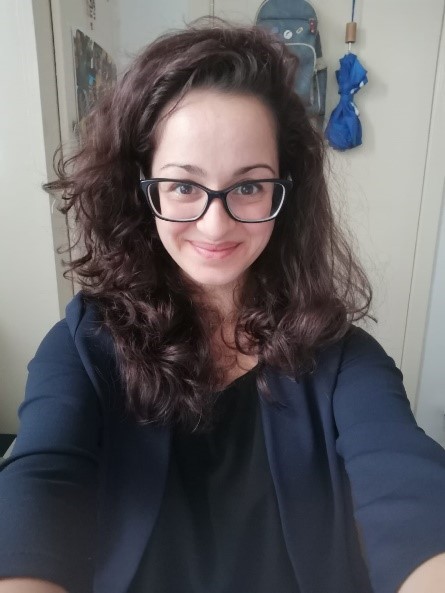
One of the happiest moments of my life was when I finally submitted my PhD thesis. After 3 years of hard work, countless number of experiments, endless hours in front of my computer analyzing data, and months of chapters’ revisions, that single “click” felt like finally removing a boulder (more precisely a boulder the size of a blue whale) from my shoulders. Of course, the light at the end of the tunnel turned out to be a train racing towards me and that train was called “viva examination”.
Following my experience, my first advice to the PhD students who have just summited their thesis is to take some time off after submission to recharge and forget about the thesis for a couple of weeks. Of course, that depends on how far the submission is from the viva. In my case, after submitting on the 25th of June 2020, I had to wait until the 23rd of September 2020 for my exam which gave me 3 months to prepare. Which brings us to the main topic of this blog, how did I prepare for my viva? Below are some tips and suggestions according to my experience.
- Relax after submitting the thesis
I have said this already but I would like to highlight again. I believe that (at least) a couple of weeks are essential to release all the stress of the submission. Take a walk to the park, go away from your screen for a while and, maybe, reconnect with all those family members and friends who have received a “please, do not disturb me while I am writing” message for the past months.
2. Read your thesis (read your thesis again, and then read it once more)
I am sure you can recite your thesis page by page without even looking at it. However, while preparing for the viva, it is important to do a constructive reading of your thesis. Personally, I cleaned my desk from all the cups of coffee and biscuit crumbs and replaced them with my thesis, one notebook, post-its, one highlighter and one red pen (and some plants for positive vibes).
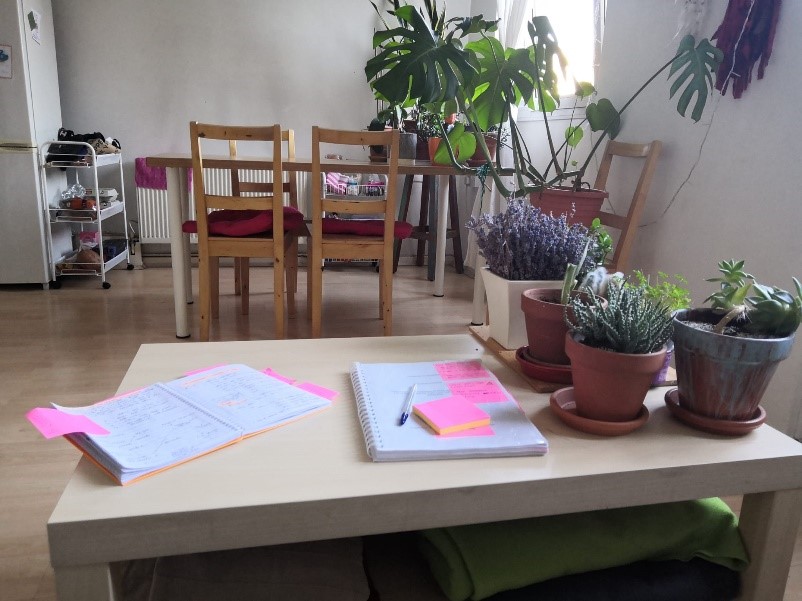
As a first step, I read my thesis once (cover to cover) to refresh my memories of it after my summer holidays. During this first reading, even though I had carefully read the thesis before submission, I noticed many typos and errors (included wrongly labelled figures!). My advice, if you notice mistakes, is DO NOT PANIC. Use your red pen to mark these mistakes and be ready for these to be mentioned during the viva. Personally, when one of my examiners said during the viva “there are some typos”, I just replied “Yes, apologies for that. I have actually started correcting those” and that was it.
The second reading of the thesis required a bit more work. I used my post-its to mark important paragraphs and write down possible questions. While writing the thesis, I had some meetings with my supervisors about the content of the chapters as well as strengths and weakness of the thesis. These were incredibly valuable as they gave me an idea of possible questions. My advice is to ask your supervisors for one (or more) meeting to discuss this.
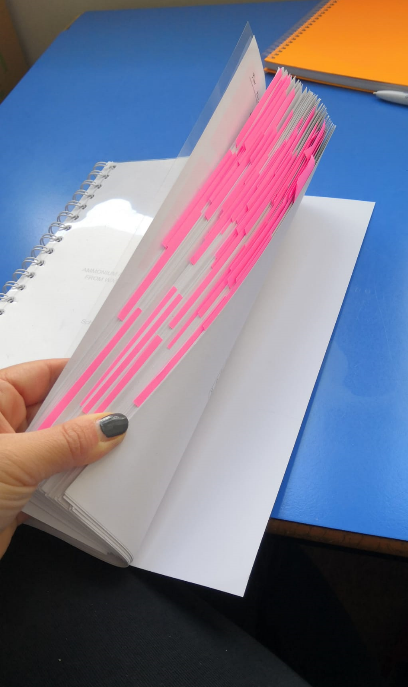
During the third reading of the thesis, I actually went back to the first post-it and started answering the questions. I wrote down a bullet point answer to each question in my notebook using the information in my thesis but, if needed, also including a couple of points to show that I was able to critically evaluate what I had written.
3. Dig in your examiners’ academic life
I was able to know the names of my examiners (internal and external) about a month before the viva. This was incredibly helpful because I could dedicate part of my viva preparation to get to know their academic life. I looked for their last publications and academic interests and wrote down any similarity between my work and theirs. If your examiners have spent part of their research life working on a topic similar (or even remotely similar) to something you have done, it is highly possible that their attention during the viva will be focused on that topic. Write down the title of the papers and highlight crucial paragraphs so that you can go back to those during the viva.
4. Look for “commonly asked questions”
Your thesis is your work and you won’t be able to predict the questions you will receive during the viva. However, on the internet, there are some lists of “commonly asked” questions (i.e. “what’s your contribution to knowledge?”, “what’s original about your thesis?”, “what are the strongest/weakest parts of your work?” etc.). Below you can find some of the links I have used. Also in this case, I replied to these in my notebook with bullet points.
https://pages.cpsc.ucalgary.ca/~saul/wiki/uploads/Chapter1/NastyPhDQuestions.html
5. The final countdown
Alright. So, at this point, the viva is days away and you are dreaming about it every night. Your stress level is off of the chart and you would like to run away and never come back (luckily, days before my viva, London was still in lockdown and I could not go anywhere!). My advice, at this point, is to take a day to relax, or even one morning: go to the park, sleep, eat properly and get ready for the last review.
I spent the last days before my viva practicing my presentation and reviewing the questions and answers in my notebook. I practiced out loud, in front of the mirror and, a couple of times, even at the park.
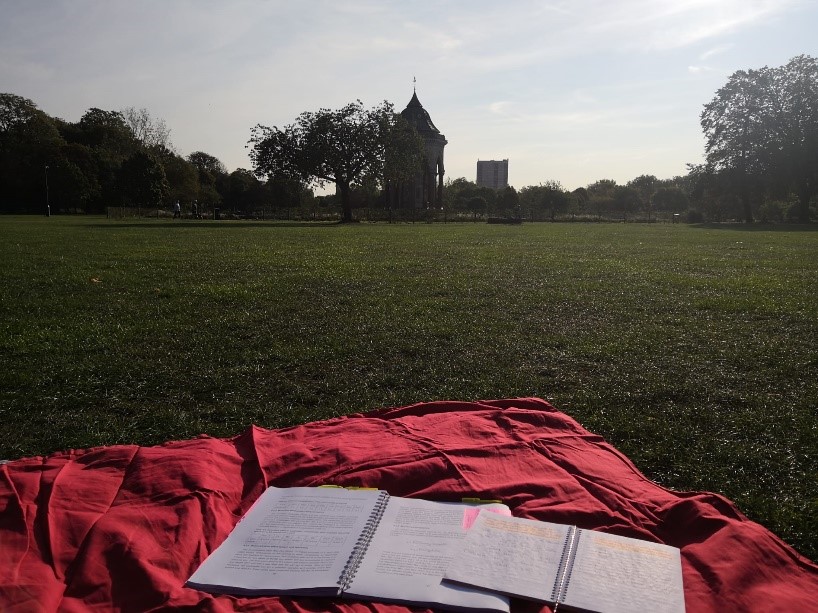
The day of the viva
My advice for the day of the viva is to go to sleep early the night before (you will need the energy), have a nice breakfast and wear something that makes you feel confident (never underestimate the power of a well-ironed shirt!). One of the best advice that was given to me was “remember that, in that room, no one knows your thesis better than you”.
In general, during the actual exam, I received two kinds of questions: about the thesis and the overall impact of my work. The first mostly focused on technical aspects of my work (“why did you choose this approach?”, “can you explain better this paragraph?”) and required a critical and more in-depth analysis of my work. More enjoyable were the questions about the overall impact and contribution of my work as, after reading so much literature, I could comfortably highlight its strengths and weaknesses.
For the actual viva, my first advice is to attentively listen to what your examiners are asking. At the beginning of the discussion, I was so nervous that, as soon as the examiner started speaking, I started thinking “would I be able to reply to this question?” did not hear the actual question and had to ask him to repeat it. Secondly, do not panic if you don’t know the answer to a question. Just ask to repeat to be sure you have correctly understood what has been asked and, if still not clear, just admit you do not know the answer (this happened to me twice). Finally, if the exam is taking too long, do not be afraid to ask for a break. This will give you time to have some water and rearrange your thoughts.
Personally, my viva lasted about 4.5 hours (the first 2 hours felt like 5 minutes, the rest felt like a lifetime…), including initial introductions, the actual discussion and the proclamation. I cannot say that it was a “fun experience” but I do believe I was well prepared and the discussion with my examiners was (almost) enjoyable!
In the end, I received major corrections (a definition of minor and major corrections can be found here: https://intranet.cranfield.ac.uk/ResearchLearnTeach/EdSupp/CAAS/Pages/PhD-VIVA.aspx).
Initially, I thought this meant spending another 6 months working on my thesis but I was able to successfully address all the corrections (29 in total) in less than 2 months while working full-time.
Other suggestions
- Prepare a good presentation
The first 10 minutes of your viva is about your presentation. This could be a good starting point and, personally, having a presentation at the beginning of the viva acted like an ice-breaker. Make sure you discuss your presentation with your supervisors and try to focus on the main contribution to knowledge of your work.
2. Use your University’s resources
Cranfield University has a page dedicated to Thesis Hand-In FAQs and PhD Viva. Additionally, the Research student handbook has a dedicated chapter on the viva (Chapter 8 – Research Student Examination). Be sure you familiarise yourself with these as they may have most of (if not all) the answers to your questions.
3. Celebrate the viva!
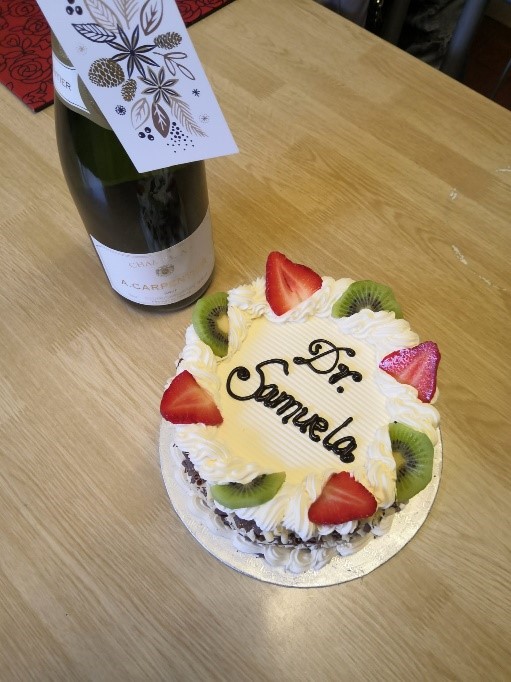
Categories & Tags:
Leave a comment on this post:
You might also like…
Keren Tuv: My Cranfield experience studying Renewable Energy
Hello, my name is Keren, I am from London, UK, and I am studying Renewable Energy MSc. My journey to discovering Cranfield University began when I first decided to return to academia to pursue ...
3D Metal Manufacturing in space: A look into the future
David Rico Sierra, Research Fellow in Additive Manufacturing, was recently involved in an exciting project to manufacture parts using 3D printers in space. Here he reflects on his time working with Airbus in Toulouse… ...
A Legacy of Courage: From India to Britain, Three Generations Find Their Home
My story begins with my grandfather, who plucked up the courage to travel aboard at the age of 22 and start a new life in the UK. I don’t think he would have thought that ...
Cranfield to JLR: mastering mechatronics for a dream career
My name is Jerin Tom, and in 2023 I graduated from Cranfield with an MSc in Automotive Mechatronics. Originally from India, I've always been fascinated by the world of automobiles. Why Cranfield and the ...
Bringing the vision of advanced air mobility closer to reality
Experts at Cranfield University led by Professor Antonios Tsourdos, Head of the Autonomous and Cyber-Physical Systems Centre, are part of the Air Mobility Ecosystem Consortium (AMEC), which aims to demonstrate the commercial and operational ...
Using grey literature in your research: A short guide
As you research and write your thesis, you might come across, or be looking for, ‘grey literature’. This is quite simply material that is either unpublished, or published but not in a commercial form. Types ...






